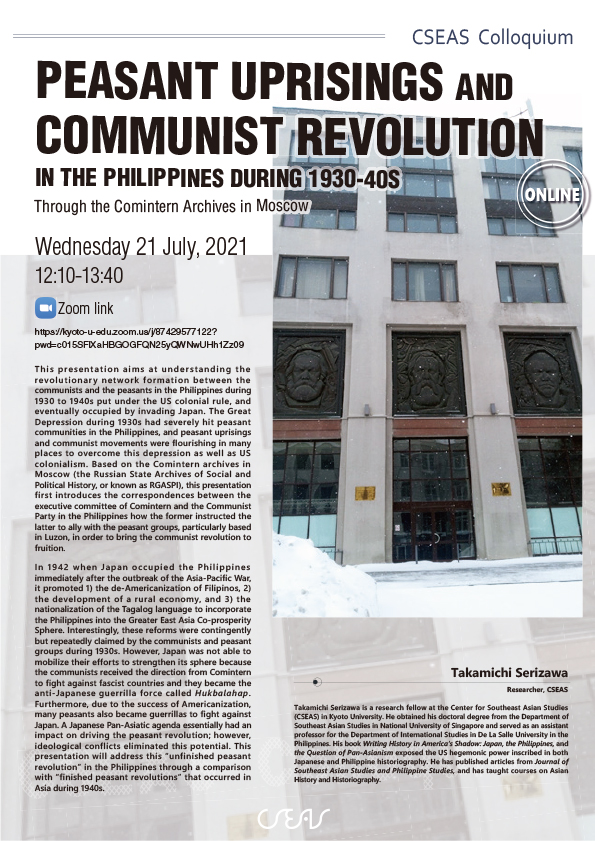Date & Time: Wednesday 21 July, 2021, 12:10-13:40
Zoom Link :
https://kyoto-u-edu.zoom.us/j/87429577122?pwd=c015SFlXaHBGOGFQN25yQWNwUHh1Zz09
Title: Peasant Uprisings and Communist Revolution in the Philippines during 1930-40s: Through the Comintern Archives in Moscow
Speaker: Takamichi Serizawa
This presentation aims at understanding the revolutionary network formation between the communists and the peasants in the Philippines during 1930 to 1940s put under the US colonial rule, and eventually occupied by invading Japan. The Great Depression during 1930s had severely hit peasant communities in the Philippines, and peasant uprisings and communist movements were flourishing in many places to overcome this depression as well as US colonialism. Based on the Comintern archives in Moscow (the Russian State Archives of Social and Political History, or known as RGASPI), this presentation first introduces the correspondences between the executive committee of Comintern and the Communist Party in the Philippines how the former instructed the latter to ally with the peasant groups, particularly based in Luzon, in order to bring the communist revolution to fruition.
In 1942 when Japan occupied the Philippines immediately after the outbreak of the Asia-Pacific War, it promoted 1) the de-Americanization of Filipinos, 2) the development of a rural economy, and 3) the nationalization of the Tagalog language to incorporate the Philippines into the Greater East Asia Co-prosperity Sphere. Interestingly, these reforms were contingently but repeatedly claimed by the communists and peasant groups during 1930s. However, Japan was not able to mobilize their efforts to strengthen its sphere because the communists received the direction from Comintern to fight against fascist countries and they became the anti-Japanese guerrilla force called Hukbalahap. Furthermore, due to the success of Americanization, many peasants also became guerrillas to fight against Japan. A Japanese Pan-Asiatic agenda essentially had an impact on driving the peasant revolution; however, ideological conflicts eliminated this potential. This presentation will address this “unfinished peasant revolution” in the Philippines through a comparison with “finished peasant revolutions” that occurred in Asia during 1940s.
Bio:
Takamichi Serizawa is a research fellow at the Center for Southeast Asian Studies (CSEAS) in Kyoto University. He obtained his doctoral degree from the Department of Southeast Asian Studies in National University of Singapore and served as an assistant professor for the Department of International Studies in De La Salle University in the Philippines. His book Writing History in America’s Shadow: Japan, the Philippines, and the Question of Pan-Asianism exposed the US hegemonic power inscribed in both Japanese and Philippine historiography. He has published articles from Journal of Southeast Asian Studies
